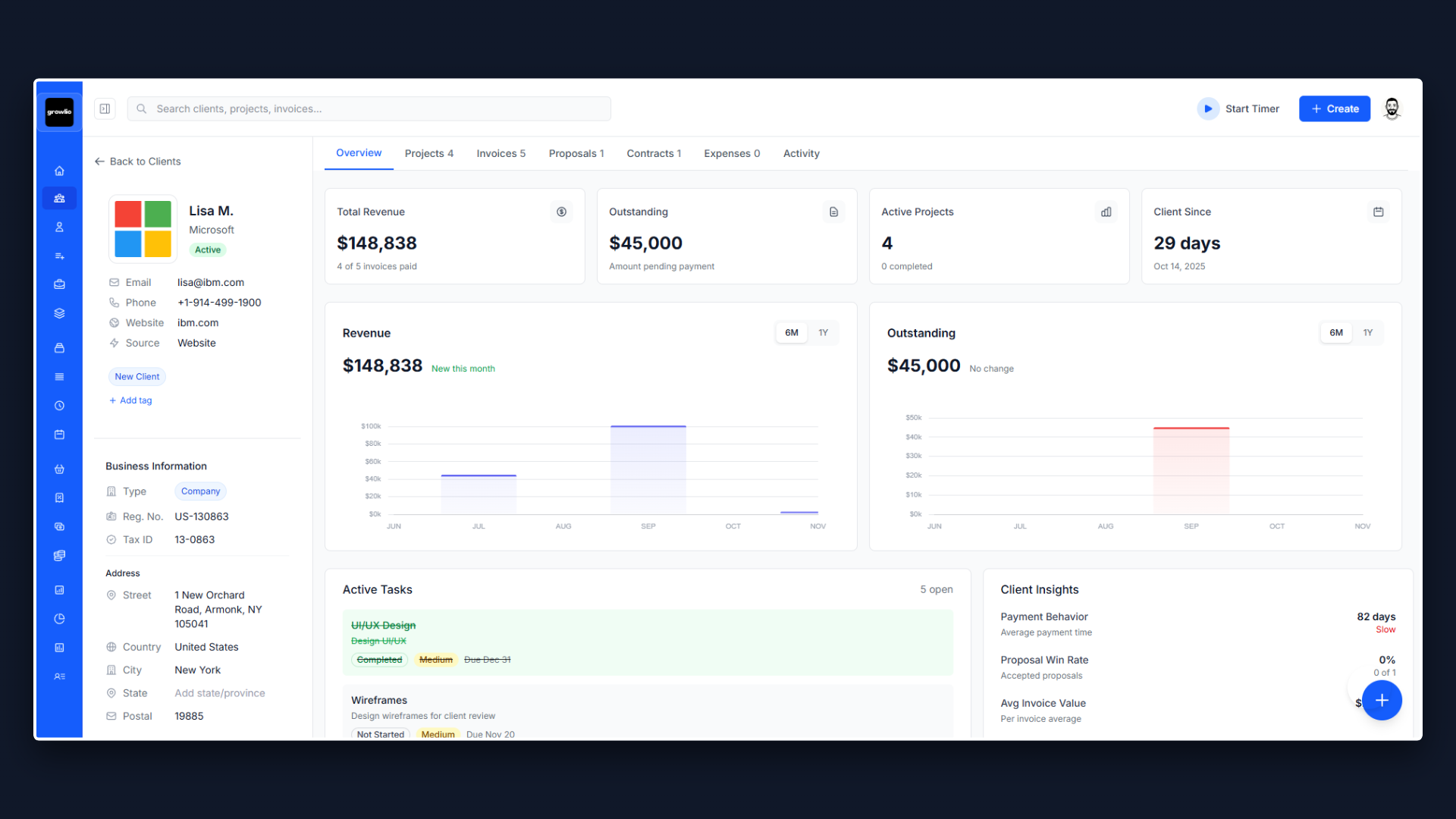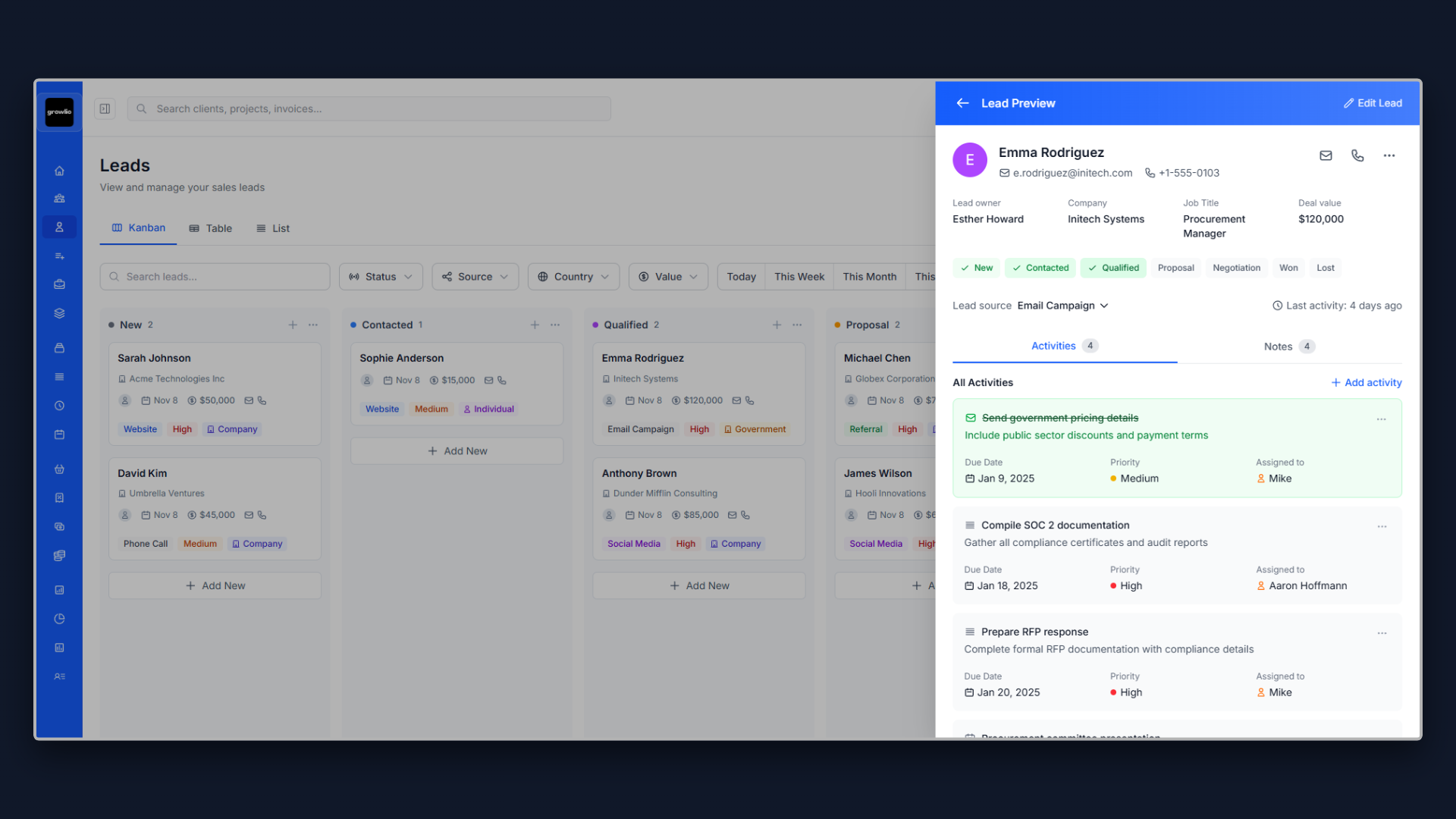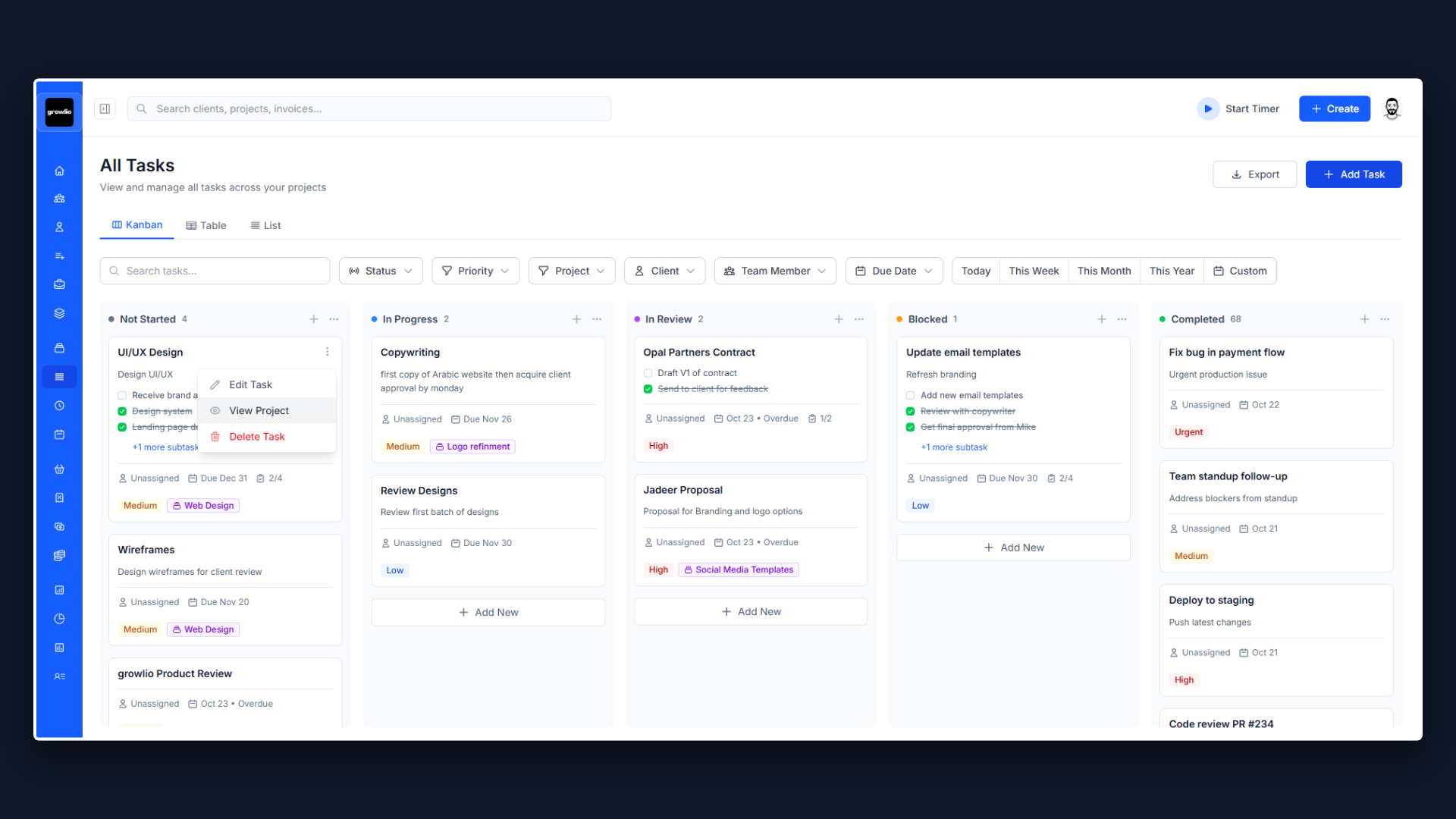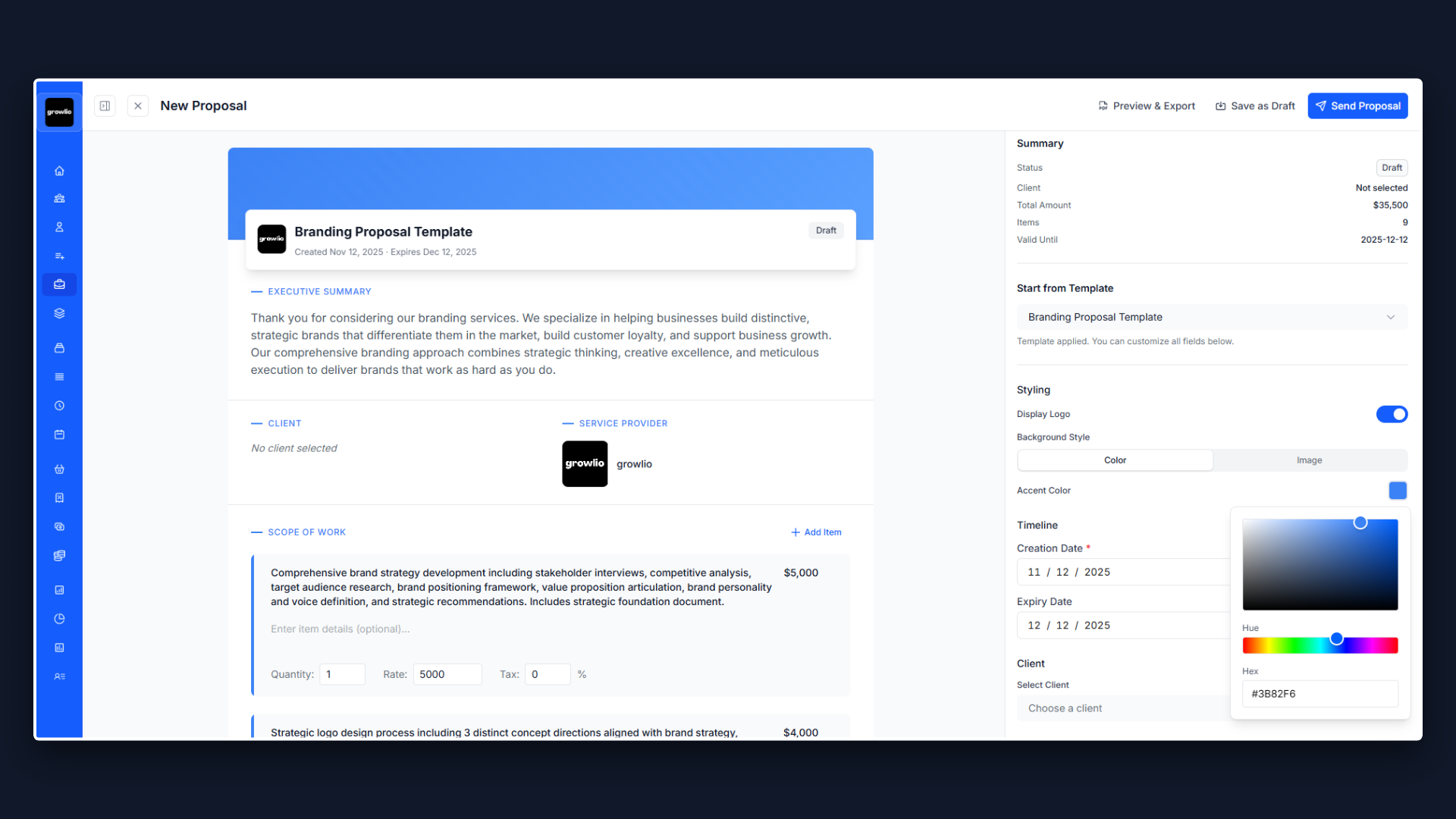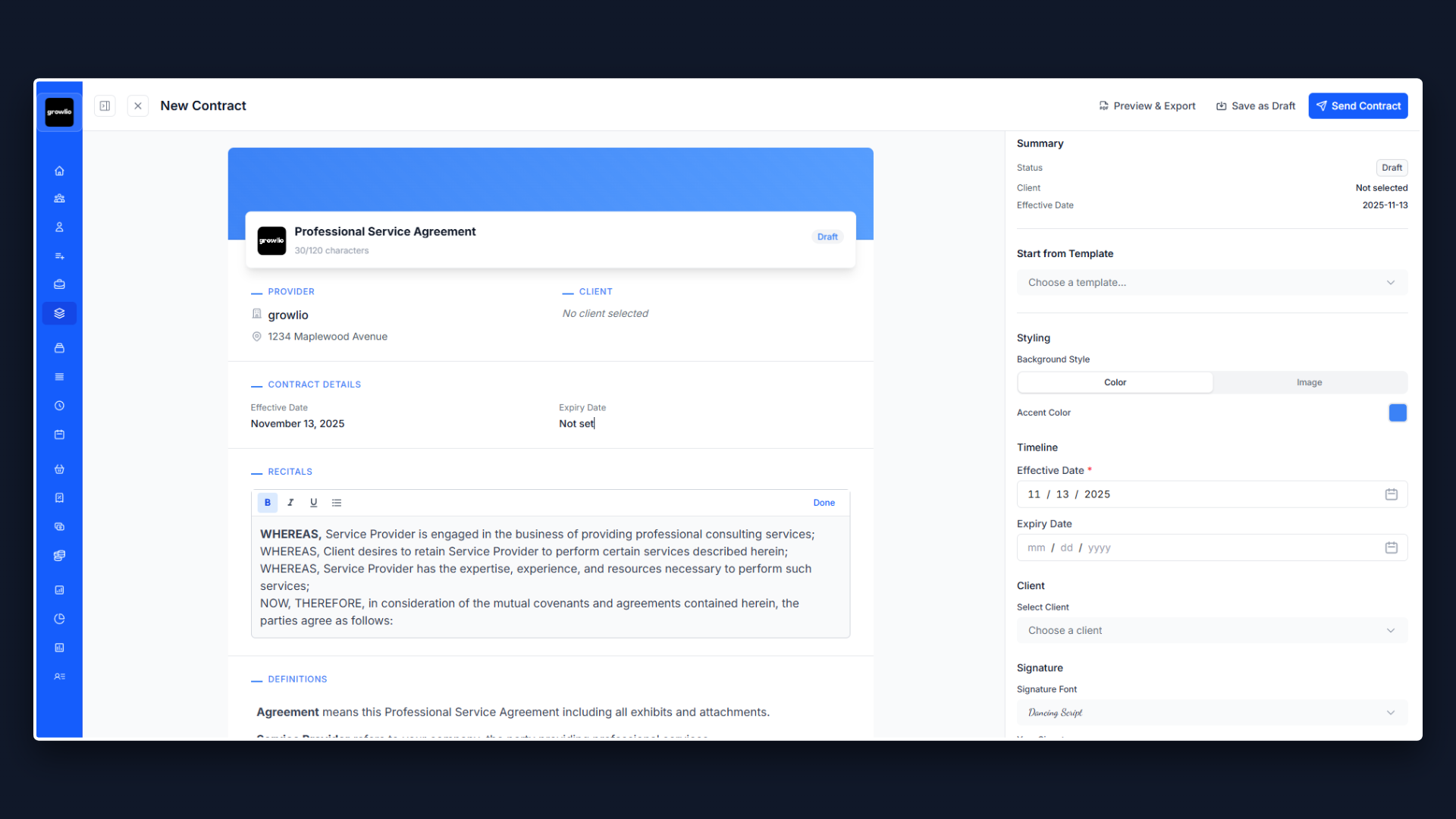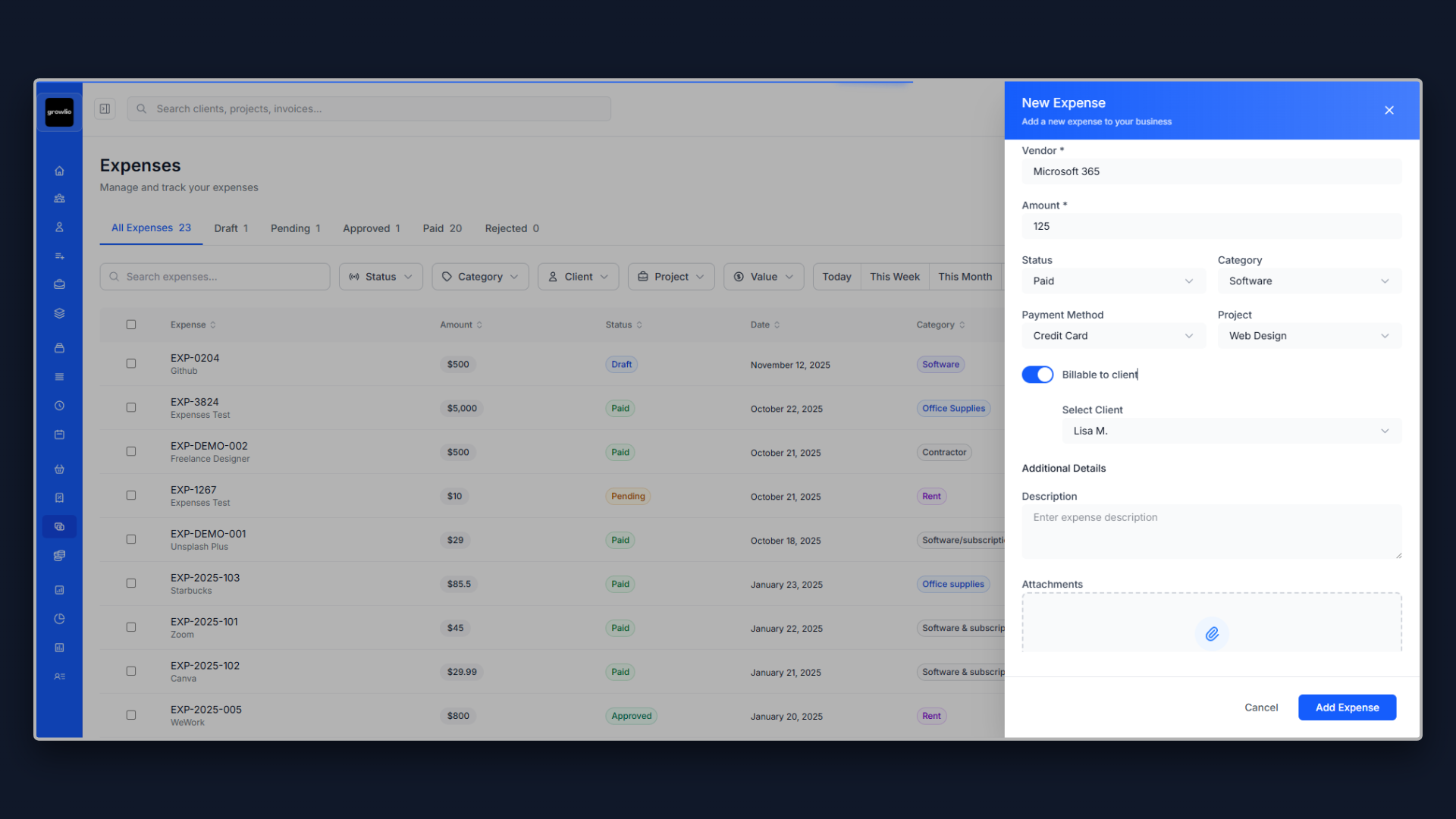Why Your Bookkeeping Proposal Determines Whether Clients Trust You With Their Numbers
In bookkeeping, you are not just recording transactions—you are creating the financial foundation that businesses rely on for tax compliance, loan applications, investor reporting, and critical business decisions. Before a business owner hands you access to their bank accounts, credit cards, and financial systems, they need confidence you will be accurate, organized, reliable, and protect their sensitive financial data.
The bookkeeping services industry generates over $10 billion annually in the U.S., with every business requiring some level of bookkeeping support to maintain financial records, track income and expenses, and prepare for tax filing. Yet 40% of small business owners say bookkeeping is their most hated task, and 60% feel they do not have a good grasp of their business finances. The difference between bookkeepers charging $35/hour and those commanding $75+/hour often comes down to how they present their expertise, systems, and value in proposals.
Your bookkeeping proposal needs to accomplish several critical objectives simultaneously: demonstrate you understand accounting principles and QuickBooks (or their platform), prove you have systems to ensure accuracy, timeliness, and organization, showcase your ability to clean up messes and bring order to chaos, address concerns about cost, communication, and data security, and differentiate yourself from DIY attempts and cheap offshore services. This is your opportunity to transform from a transaction recorder into a trusted financial partner who brings clarity and confidence to business finances.
1. Open With the Cost of Poor Bookkeeping, Not Your Experience
The biggest mistake bookkeepers make is leading with credentials: "I have 10 years of bookkeeping experience..." Your prospect does not care about your experience yet. They care about the problems poor bookkeeping creates and the cost of financial chaos.
Start by demonstrating you understand what is at stake with messy books. For a small business owner, open with: "Without accurate, up-to-date bookkeeping, your business operates in the dark: You cannot make informed decisions about pricing, hiring, or spending because you do not know your true profitability. Tax time becomes a nightmare of scrambling for receipts and records, often resulting in overpaid taxes from missed deductions ($3,000-$8,000 average for small businesses). Bank loans or investor funding become impossible when you cannot provide clean financials proving your business performance. IRS audits are far more likely and painful when your records are disorganized or incomplete. You waste 5-10 hours monthly trying to keep up with bookkeeping yourself—time worth $500-$2,000 you could spend growing your business. The cost of poor bookkeeping is not just stress and wasted time—it is missed opportunities, overpaid taxes, and business decisions made without accurate financial information."
For a business with neglected books: "Looking at 8 months of unreconciled accounts, uncategorized transactions, and missing documentation is overwhelming. You know you need to fix it but do not know where to start. The longer you wait, the worse it gets: Tax deadlines approaching with no clean records for your accountant. Bank requiring financials for loan renewal but you cannot produce them. Potential buyers or investors walking away because you cannot prove your revenue claims. IRS penalties if you miss filing deadlines or make errors from incomplete records. The cost of cleanup grows every month you delay. You need a bookkeeper who specializes in bringing order to chaos, not someone who will judge you for the mess or charge you double for cleanup work."
This problem-focused opening immediately reframes the conversation from "cost of hiring a bookkeeper" to "cost of NOT having clean books." Now they are ready to hear your solution.
2. Define Your Bookkeeping Scope Precisely
Scope ambiguity destroys bookkeeping relationships. Clients expect you to handle everything financial. You feel overworked for your monthly fee. Prevent this by defining scope clearly.
Structure scope definition precisely: Monthly Bookkeeping Services (Included): Transaction categorization for all bank and credit card accounts (up to 200 transactions monthly in base package). Bank and credit card reconciliation ensuring all accounts match statements. Accounts receivable tracking (invoices, payments received, aging reports). Accounts payable tracking (bills, payments made, vendor management). Monthly financial statements (Profit & Loss, Balance Sheet, Cash Flow Statement). QuickBooks file maintenance and cleanup. Monthly close process ensuring all transactions recorded and reconciled. Sales tax calculation and preparation of filing data (if applicable).
Included Support Services: QuickBooks Online training and support for basic functions. Answers to bookkeeping questions via email within 24 hours. Monthly summary email highlighting key financial metrics and changes. Preparation of financial data for tax accountant. Coordination with tax preparer or CPA during tax season.
Explicitly Outside Standard Scope: Tax preparation and filing (handled by your CPA or tax preparer). Payroll processing and tax filing (separate service or use payroll provider). Bill payment and check writing (we track, you pay, or use Bill.com). Accounts receivable collections (we track aging, you collect). Invoicing and billing customers (we record, you send, or we can set up automation). Cash flow forecasting and budgeting (available in advisory upgrade). Historical cleanup beyond 3 months (quoted separately as project). Industry-specific requirements (inventory management, job costing, multi-entity consolidation).
Client Responsibilities: Provide bank and credit card statements by 5th of following month (or ensure we have online access). Respond to categorization questions within 48 hours. Provide receipts or explanations for unclear transactions. Notify us of loans, major purchases, or significant business changes. Review monthly financials and ask questions about anything unclear. Keep separate business and personal expenses (commingling makes bookkeeping difficult and expensive).
Transaction Volume Tiers: Base package (up to 200 transactions/month): Standard pricing. Medium volume (200-400 transactions/month): +$200/month. High volume (400-600 transactions/month): +$400/month. Very high volume (600+ transactions/month): Custom pricing based on actual volume.
Our Delivery Commitments: Monthly financials delivered by 15th of following month (if you meet 5th document deadline). Email responses within 24 business hours. Quarterly review calls to discuss financials and answer questions. Year-round availability (not disappearing after tax season like some bookkeepers).
This exhaustive definition prevents scope creep and sets clear expectations about what you will and will not do.
3. Demonstrate QuickBooks Expertise and Software Knowledge
Generic bookkeeping claims do not differentiate you. Show specific platform expertise and technology skills.
Present targeted expertise: QuickBooks Expertise: QuickBooks Online Advanced Certified ProAdvisor (or your certification level). 7+ years working exclusively in QuickBooks Online (or Desktop if applicable). Completed 100+ QuickBooks setups and migrations for businesses like yours. Expert in QuickBooks integrations and app ecosystem (Bill.com, Gusto, Stripe, PayPal, etc.). Trained in QuickBooks best practices for chart of accounts, classes, locations, and reporting. Active in QuickBooks community and continuing education (20+ hours annually).
Software and Tools We Use: QuickBooks Online (our primary platform—we can also work in Desktop if needed). Receipt Bank or Dext for receipt management and automation. Bill.com for accounts payable workflow (if you use it). Gusto, ADP, or Paychex for payroll integration. Stripe, Square, PayPal, Shopify for payment processing integration. Google Drive or Dropbox for secure document sharing. Loom or Zoom for training videos and screen sharing.
What We Can Set Up or Fix: Chart of accounts properly structured for your industry and reporting needs. Bank feeds connected and rules set up for automatic categorization. Invoice templates branded with your logo and payment terms. Recurring transactions for regular income or expenses. Class and location tracking if you need profit by department or location. Integration with your payment processors, payroll, or other apps. Custom reports showing the metrics you care about most. User access for you, your accountant, and team members with appropriate permissions.
Industries We Serve: E-commerce and online retail (inventory, COGS, multi-channel sales). Professional services (project tracking, client profitability). Contractors and construction (job costing, progress billing, retainage). Real estate agents and property managers (commission tracking, rental properties). Creative agencies (project-based revenue, contractor payments). [Customize this list to your actual specialization]
What Makes Us Different: QuickBooks specialization: We work in QuickBooks daily, not juggling 5 different platforms. Cleanup expertise: We have brought order to hundreds of messy QuickBooks files. Automation focus: We set up rules and integrations reducing manual data entry by 60-80%. Training included: We teach you how to use QuickBooks for daily tasks so you are not completely dependent. Proactive communication: We flag issues and opportunities, not just process transactions silently. Industry knowledge: We understand your business model and set up books accordingly.
This specific expertise presentation proves you are not a generic bookkeeper but a QuickBooks specialist who understands their business type.
4. Outline Your Monthly Process and Quality Control
Clients fear bookkeepers who make errors, miss transactions, or produce unreliable financials. Demonstrate your systematic approach.
Present your methodology clearly:
Our Monthly Bookkeeping Process: Days 1-5: Client provides statements and access (or we download from bank feeds). We review transactions imported via bank feeds. We identify transactions needing clarification and send questions to client. Days 6-10: Categorize all transactions using established rules and chart of accounts. Match transactions to invoices and bills where applicable. Create manual journal entries for accruals, prepayments, or corrections. Record any transactions not captured by bank feeds (checks, cash, transfers). Days 11-13: Reconcile all bank accounts to statements ensuring no missing transactions. Reconcile all credit card accounts to statements. Investigate and resolve any discrepancies between QuickBooks and bank. Document reconciliation completion date and any issues. Days 14-15: Generate monthly financial statements (P&L, Balance Sheet, Cash Flow). Review for unusual items, errors, or anomalies (negative expenses, sudden changes). Calculate key metrics (gross margin, burn rate, revenue growth). Prepare monthly summary email with insights and questions. Deliver financial package via email with PDF reports and QuickBooks access.
Quality Control Procedures: Automated reconciliation checks before closing month (no unreconciled items). Balance sheet review for negative balances or other red flags. P&L review comparing to prior month and prior year same month. Account balance reasonableness checks (receivables not too high, cash matches bank). Transaction review sampling 10-20 transactions monthly for proper categorization. Second review by senior bookkeeper for new clients (first 3 months).
What We Track and Report: Revenue by product, service, or customer (if you track this). Expenses by category with comparison to budget or prior periods. Accounts receivable aging (who owes you money and how long overdue). Accounts payable aging (bills due and payment timing). Cash position and burn rate (how long current cash will last). Key metrics specific to your business (gross margin, customer acquisition cost, etc.).
Communication and Collaboration: Monthly: Financial statements with summary email by 15th of following month. Quarterly: Review call to discuss financials, answer questions, and plan ahead (15-30 minutes). As needed: Email or phone for questions, unusual transactions, or issues (response within 24 hours). Tax season: Coordination with your CPA providing clean books and answering questions. Annual: Year-end review ensuring books ready for tax preparation and accurate for the year.
This systematic approach demonstrates professionalism and builds confidence in your accuracy and reliability.
5. Present Clear, Transparent Pricing
Hourly billing creates uncertainty and misaligned incentives. Present clear fixed monthly pricing with defined scope.
Outline pricing clearly: Monthly Bookkeeping Packages:
Starter Package - $400/month
Best for: Very small businesses, freelancers, or service businesses with simple finances. Includes: Up to 100 transactions per month, 1-2 bank accounts, 1 credit card, monthly reconciliation and financial statements, QuickBooks support, email support. Does not include: Payroll, sales tax filing, accounts receivable/payable tracking, cleanup work.
Growth Package - $650/month
Best for: Small businesses with moderate transaction volume and complexity. Includes: Up to 200 transactions per month, up to 4 bank/credit card accounts, accounts receivable and payable tracking, monthly reconciliation and financial statements, sales tax calculation and prep, QuickBooks support and training, quarterly review calls. Most popular package for established small businesses.
Professional Package - $950/month
Best for: Established businesses with higher volume or complexity. Includes: Up to 400 transactions per month, unlimited bank and credit card accounts, full AR/AP management, inventory tracking (basic), class or location tracking, monthly reconciliation and financial statements, sales tax calculation and prep, QuickBooks support and training, monthly review calls, priority support.
Add-On Services: Payroll processing: $150-$300/month depending on employee count (or we integrate with Gusto/ADP). Sales tax filing: $50-$100 per return (we calculate, you approve, we file). Bill payment service: $100/month for Bill.com management and payment processing. Invoicing service: $75/month to send invoices and track payments. Extra transaction volume: $0.75-$1.50 per transaction over package limit. Additional accounts: $25/month per bank or credit card account over package limit.
One-Time Project Services: QuickBooks setup: $500-$1,500 depending on complexity and data migration needs. Bookkeeping cleanup: $75-$100/hour estimated after reviewing records (typical cleanup: $1,500-$5,000). Annual catch-up (tax season rescue): $100-$150/hour rushed rate if needed before tax deadline. Training sessions: $100/hour for one-on-one QuickBooks training beyond standard support.
What Affects Monthly Pricing: Transaction volume (more transactions = more time = higher price). Number of accounts (more accounts to reconcile = more work). Complexity (inventory, job costing, multi-entity = higher tier). Industry requirements (real estate trust accounting, construction retainage = premium). Quality of records (organized clients cost less to serve than messy records). Payment terms integration (connecting 5 payment processors vs. 1 = more complexity).
Payment Terms: Monthly packages: Auto-pay on 1st of month via ACH or credit card (required for monthly service). Setup and cleanup projects: 50% deposit to start, balance on completion. Annual pre-pay discount: 10% discount if you pay full year upfront ($650/month becomes $585/month). Referral credit: $100 credit for each referral that becomes a client.
Trial Period: First 3 months are trial period for both of us. Either party can end with 30-day notice if not a good fit. After 3 months, standard 60-day notice required to end service (allows time for transition).
This transparent pricing lets clients budget accurately and choose the right package for their needs.
6. Address Data Security and Access
Clients are giving you access to their bank accounts and financial data. Address security proactively.
Outline security measures: How We Protect Your Financial Information:
Secure Access Methods: Read-only bank feed access through QuickBooks (we never have login credentials to your actual bank). QuickBooks user access with appropriate permission level (no ability to cut checks or make transfers). Two-factor authentication required on all QuickBooks and app accounts. Unique strong passwords managed in password manager (1Password). No sharing of login credentials via email or text (only secure methods).
Data Protection: All work done in cloud-based QuickBooks (bank-level 256-bit encryption). Secure document portal for receipt and document sharing (no email attachments with sensitive data). Work devices encrypted and password-protected. Secure home office with locked file cabinet for any paper documents. Confidentiality agreement protecting your business information.
Professional Standards: Professional liability insurance ($500K coverage) protecting both of us. Background check and clean record. Member of professional associations (AIPB, NACPB) with ethical standards. Signed engagement letter clearly defining our relationship and responsibilities. We never share client information or data without explicit written permission.
Access We Need: QuickBooks Online admin or company admin access. Bank feed connections through QuickBooks (not direct bank login). Access to payment processor portals (Stripe, PayPal, etc.) for transaction details if needed. Shared folder (Google Drive, Dropbox) for receipts and documentation. Email access to accounting/bookkeeping email if you want us to handle vendor inquiries.
Access We Do Not Need: Direct login to your bank accounts (bank feeds handle this). Ability to transfer money or cut checks (unless explicitly requested for bill pay service). Access to personal accounts or unrelated business accounts. Social Security numbers or sensitive personal information (beyond what is in QuickBooks for business).
This comprehensive security discussion addresses a major concern for clients sharing financial access.
7. Showcase Cleanup Expertise and Problem-Solving
Many bookkeeping clients come to you with messy books needing cleanup. Position this as your strength, not a problem.
Demonstrate cleanup expertise: We Specialize in Bringing Order to Bookkeeping Chaos:
Common Messes We Fix: Months or years of unreconciled accounts (bank balances not matching QuickBooks). Uncategorized transactions lumped into "misc expense" or "uncategorized." Personal and business expenses commingled in same accounts. Duplicate transactions from importing same data twice. Missing transactions (gaps in check numbers, unrecorded deposits). Incorrect account types (credit card as bank account, loan as expense). Messy chart of accounts (100+ accounts when 30 would work better). No accounts receivable or payable tracking. Sales tax not tracked or calculated incorrectly.
Our Cleanup Process: Step 1 - Assessment: Review QuickBooks file and bank statements to understand scope of mess. Identify timeframe needing cleanup (3 months? 2 years?). Estimate hours and provide fixed-price quote for cleanup project. Step 2 - Foundation: Clean up and optimize chart of accounts. Set up proper account types and structure. Delete duplicate transactions and correct account assignments. Step 3 - Reconciliation: Reconcile all accounts back to last clean reconciliation (or beginning). Identify and resolve all discrepancies. Document assumptions and decisions made. Step 4 - Categorization: Properly categorize all transactions with appropriate accounts. Set up rules for recurring transactions going forward. Create memos/notes documenting unclear transactions. Step 5 - Validation: Generate financial statements and review for reasonableness. Compare to tax returns if available to validate revenue and key expenses. Fix any remaining errors or anomalies. Step 6 - Documentation: Provide summary of work completed and assumptions made. Train you on how to maintain going forward. Transition to monthly bookkeeping service with clean starting point.
What Cleanup Typically Costs: 3-6 months cleanup: $1,500-$3,000 typical (10-20 hours). 1 year cleanup: $3,000-$6,000 typical (20-40 hours). 2+ years cleanup: $6,000-$15,000 depending on volume and mess level (40-100+ hours). Factors affecting cost: transaction volume, how messy records are, whether bank statements available, commingling of personal and business, missing documentation.
Why Cleanup Is Worth It: Clean books allow accurate tax preparation (potentially saving thousands in tax prep fees and overpaid taxes). You can finally see true profitability and make informed decisions. Bank loans and investor funding become possible with clean financials. Stress and anxiety of financial chaos eliminated. Future monthly bookkeeping is easier and less expensive with clean starting point.
No Judgment Zone: We have seen it all—you are not alone in having messy books. We do not judge you for letting it get behind—we just fix it. Many successful businesses have gone through cleanup—it is more common than you think. The important thing is you are addressing it now before it gets worse.
This cleanup positioning makes you valuable to prospects with the messiest (and often most profitable) situations.
8. Include Client Testimonials and Before/After Examples
Claims are easy. Proof is powerful. Include 2-3 testimonials showing problems you have solved.
Format social proof clearly: Jennifer T., E-commerce Business Owner
"I let my bookkeeping slide for 18 months while growing my Shopify store from $200K to $800K in sales. My QuickBooks was a disaster—thousands of uncategorized transactions, inventory was wrong, I had no idea if I was actually profitable. [Bookkeeper Name] cleaned up the entire mess in 3 weeks. Now I get clean financials by the 10th of every month, my inventory is accurate, and I can finally see which products are profitable. I sleep better knowing my books are clean and my tax accountant is not going to kill me. Worth every penny."
Michael R., Contractor
"I was doing my own bookkeeping in QuickBooks but I knew it was wrong—I just did not know how to fix it. My accountant kept telling me my books were a mess but could not help because they only do taxes. [Bookkeeper Name] restructured everything for job costing, set up proper invoice tracking, and taught me how to use QuickBooks correctly. Now I can see profitability by job and make better bidding decisions. My accountant actually complimented my books this year—that has never happened."
Sarah K., Marketing Agency
"After firing our previous bookkeeper who disappeared for 2 months without communication, I needed someone reliable to take over. [Bookkeeper Name] fixed the errors, reconciled 6 months of accounts, and got us back on track in 3 weeks. She communicates proactively, answers my questions quickly, and makes me feel confident in our numbers. Having a bookkeeper I can trust has reduced my stress significantly."
Results We Have Delivered: Cleaned up 2 years of neglected books for consultant, enabling them to secure $150K business loan they had been denied with messy financials. Identified $12,000 in unrecorded revenue for e-commerce client during cleanup, money they did not realize they were owed. Reduced tax preparation fees by $2,500 for client by providing clean, organized books instead of shoe box of receipts. Set up proper inventory tracking for product business, revealing 15% shrinkage they were unaware of worth $25,000 annually.
These specific testimonials and results prove you deliver value and solve real problems.
9. Differentiate From DIY and Cheap Alternatives
Every prospect considers doing it themselves or using cheap offshore services. Address this comparison directly.
Explain your value vs. alternatives: Why Not Just Do Bookkeeping Yourself?
DIY bookkeeping is tempting to save money, but it has hidden costs: Time cost: Small business owners spend 5-10 hours monthly on bookkeeping (worth $500-$2,000 in opportunity cost). Time spent bookkeeping is time not spent serving customers, marketing, or growing business. Error cost: Without bookkeeping training, common errors include incorrect categorization (overpaying taxes), missed reconciliations (not catching fraudulent charges or errors), poor chart of accounts (making reports useless), and commingled personal and business (IRS red flag and audit trigger). Stress and anxiety: Never feeling confident your books are right. Dreading tax time because you know it will be painful. Making business decisions without accurate financial data.
When DIY makes sense: Very simple business (service business with minimal transactions). You have bookkeeping training and enjoy it. Your time has low opportunity cost. You are willing to invest time learning QuickBooks properly.
Why Not Use Cheap Offshore Bookkeeping Service?
Services advertising $99-$199/month sound appealing but often deliver poor value: Quality issues: Offshore bookkeepers often lack understanding of US accounting principles and tax rules. Generic categorization without understanding your business (everything just goes to "expense"). Frequent errors requiring your time to review and fix. Communication problems: Time zone differences making real-time communication difficult. Language barriers creating misunderstandings. Slow response times to questions (24-48 hour turnarounds common). Security concerns: Giving financial access to unknown individuals in foreign countries. Less recourse if data breach or fraud occurs. No professional liability insurance protecting you. Hidden costs: Low advertised price excludes many needed services (reconciliation, cleanup, support). Surprise charges for "extra" transactions or accounts. You end up paying for fixes when errors made.
Our Approach Is Different: US-based: Same time zone, immediate communication, cultural and business understanding. Personal relationship: You work with same bookkeeper every month who knows your business. Proactive: We catch issues and opportunities, not just process transactions. Accountable: Licensed, insured, local business with reputation to protect. Comprehensive: Our pricing includes everything needed, no surprise charges for basic services.
This honest comparison helps clients understand the value gap justifying your pricing.
10. End With Clear Next Steps and Onboarding Process
Make it frictionless to engage with clear path from proposal to active client.
"We appreciate the opportunity to submit this proposal and hope to become your trusted bookkeeping partner. Clean, accurate books are the foundation of good business decisions and financial peace of mind.
What Happens Next:
Step 1: Discovery Call (20-30 minutes)
Let us schedule a call to discuss your specific situation and bookkeeping needs. We will review your current setup, pain points, and goals. You can ask questions about our process, pricing, and approach. No obligation—this helps us both determine if we are a good fit. [Calendar link] or reply with your availability.
Step 2: Proposal and Engagement
Based on our discussion, we will confirm or adjust package and pricing. Send engagement letter outlining scope, pricing, and terms. You will complete client information form with details we need. Schedule kickoff call to review QuickBooks access and process.
Step 3: Onboarding (Week 1)
QuickBooks access setup with appropriate user permissions. Bank feed connections verified or established. Review chart of accounts and make any needed optimizations. Document your preferences for categorization and reporting. If cleanup needed: Assess scope and provide project quote before starting monthly service.
Step 4: First Month
If starting fresh: Process current month transactions and deliver first financials. If cleanup needed: Complete cleanup project first, then start monthly service with clean books. Training on QuickBooks basics and how to work with us effectively. Establish communication rhythm and expectations.
Step 5: Ongoing Service
Monthly financials delivered by 15th of each month. Quarterly review calls to discuss financials and answer questions. Year-round support via email for bookkeeping questions. Annual preparation of clean books for your tax preparer.
Current Availability:
We are currently accepting new monthly bookkeeping clients. Onboarding typically takes 1-2 weeks from signed agreement. If cleanup needed, we can usually start cleanup within 1 week and complete within 2-4 weeks depending on scope.
Questions or Want to See Sample Reports?
We are happy to show you sample financial reports from our QuickBooks template. We can discuss our approach to your specific bookkeeping challenges or industry needs. We will clarify any aspect of our services, pricing, or process. Contact me at [email] or [phone], or schedule call at [calendar link].
Ready for Clean Books and Financial Clarity?
The sooner we start, the sooner you will have accurate financials, reduced stress, and confidence in your numbers. Looking forward to becoming your bookkeeping partner!"
This clear process with defined next steps makes the decision easy and engagement smooth.
Final Thoughts on Bookkeeping Proposals
Your bookkeeping proposal is the first demonstration of your organization, attention to detail, and communication skills. If it is messy, vague, or confusing, clients will assume your bookkeeping will be too. If it is clear, comprehensive, and professional, they will trust you with their financial records.
The bookkeepers who win premium clients and build sustainable practices prove they understand the cost of poor bookkeeping, not just transaction recording, define scope clearly to prevent misunderstandings and scope creep, demonstrate QuickBooks expertise and platform-specific knowledge, show systematic processes ensuring accuracy and timeliness, present transparent fixed pricing that allows budgeting, address data security and access concerns comprehensively, showcase cleanup expertise making messes your specialty, differentiate from DIY and cheap offshore alternatives, provide social proof through testimonials and results, and make onboarding easy with clear next steps and processes.
Every proposal should be customized for the specific client and situation. Reference their specific business type, current bookkeeping situation, or pain points. Highlight expertise most relevant to their industry (e-commerce, contractors, professional services). Share examples of similar clients you have helped. Be transparent about pricing, process, and what they can expect. And always position yourself as financial partner who brings clarity and confidence, not transaction processor who just categorizes expenses.
Remember: a great bookkeeping proposal proves you understand their bookkeeping challenges and frustrations, demonstrates QuickBooks expertise and systematic processes, shows you can bring order to chaos through cleanup skills, quantifies time savings and value beyond just transaction recording, reduces perceived risk through security measures and testimonials, and positions you as trusted partner enabling better business decisions through clean financials. Get these elements right, and you will win clients who value accuracy and reliability over cheap hourly rates—building a thriving bookkeeping practice with long-term relationships, predictable monthly revenue, and work that truly helps businesses succeed.
